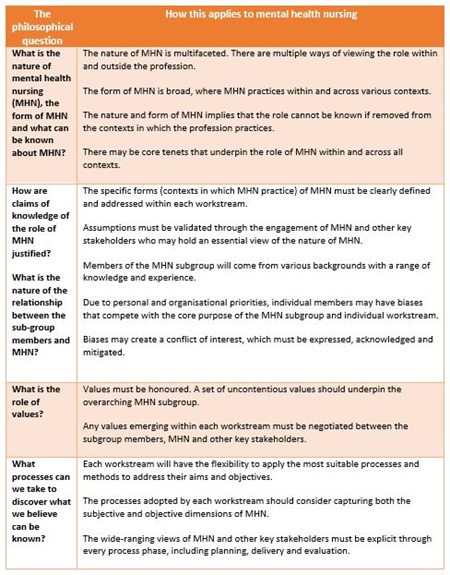The RCN has published the definition and principles of nursing. The work of registered nurses involves many specialised and complex interventions, requiring constant vigilance to ensure safety, prevent harm, and manage risks in various settings. The Principles outline the expectations of the nursing workforce to provide safe and effective care to all individuals and populations.
Mental health nursing is a complex and autonomous practice that can often be difficult to define. However, this complexity can also be a strength, allowing us to adapt to the diverse needs of our populations. However, we must comprehensively understand our professional and public-facing identities to grow and succeed in what we do.
Background
The All-England review of mental health nursing: Commitment and Growth: Advancing Mental Health Nursing Now and for the Future, was published in April 2022. Chaired by Baroness Watkins of Tavistock and led by Health Education England, the report set eight recommendations to enhance and develop mental health nursing, ensuring the profession remains attractive to prospective registrants and retains those already registered.
The overarching review group consisted of three task and finish groups looking at three areas: mental health nursing and severe mental illness; children and young people’s mental health; and improving population and public health outcomes. The task and finish groups consisted of mental health nurses, clinical and policy experts, as well as people who have lived experience of mental illness and use of services, such as patients, families and carers.
The review followed a co-production approach from the outset. With the diversity of task and finish group members, including mental health nurses from multiple organisations, practice settings unions, professional bodies and charities, keeping everyone on the same page and with clear objectives presented a challenge.
To support all task and finish group members to align to the same purpose and work within the exact boundaries and professional values, the group set out to create a paradigm that would underpin the overarching review group and each task and finish group.
What is a paradigm?
A paradigm is a set of principles and beliefs that help us articulate how we see the world, acquire knowledge, and interact with it. Paradigms are distinguished by differing beliefs and values, a set of viewpoints that cannot be proved or disproved (Guba & Lincoln, 2005).
Paradigms are often used in research and education to guide how a research study and teaching are carried out. Paradigms are also referred to as ‘philosophical assumptions’, underpinning how nurses approach practice and deliver care, i.e. the philosophy of personal recovery (Anthony, 1993).
In the context of delivering care and treatment, paradigms help nurses to apply theory into practice, being mindful of the scope and limitations of the chosen approach. Paradigms underpin the theoretical frameworks of nursing interventions, i.e. family therapy is underpinned by the theory of systems thinking.
Across the mental health nursing profession, we hold many complementary and opposing paradigms. Some will evaluate the role of the mental health nurse more objectively, valuing outcomes through measurements, targets, data and trends. Others will value the role's more subjective elements, such as patient satisfaction, communication, engagement and personal experience. Most of us sit somewhere in the middle, valuing both the objective and subjective nature of mental health nursing.
Why did we need a paradigm for the All-England review of mental health nursing?
Having a paradigm helps us to develop our critical thinking and articulate who we are and what we do as mental health nurses. A paradigm ensures a clear scope, boundaries, and values underpin our mental health nursing review approach.
Articulating our paradigm early in the review process helped us to formulate our aims and objectives, ensuring that our beliefs and values drove everything we did. A clear paradigm provided a reference point for which we evaluated the content of the review and its processes.
The paradigm also helped us to avoid pursuing aims and objectives that were not conducive to how we, the steering groups and stakeholders, viewed the role of mental health nursing and its associated values.
What sort of paradigm did we adopt?
In its academic sense, philosophy can be a complex and much-debated school of thought. Although a well-evaluated and critically applied paradigm would have offered a robust framework for this review, we needed not to overcomplicate the process. A flexible framework helped us outline our paradigm's fundamental tenets, what we believe and value, and how we would approach the programme. The framework was produced by answering five critical philosophical questions (see the table below).
A framework for the Mental Health Nursing Subgroup Paradigm
Conclusion
A group of diverse individuals worked collaboratively within a structured philosophical framework to develop the All-England Review of Mental Health Nursing. We adopted a critically-orientated approach to mitigate biases. At the outset of the review process, the team established fundamental principles to define their goals and objectives. This ensured that our core beliefs and values were explicit and guided our actions.
The well-defined set of principles served as a benchmark against which we evaluated the review's content and procedures. Other works that focus on a professional group's identity, meaning, or purpose would benefit from the formation and use of a structured yet flexible paradigm.







 Share on LinkedIn
Share on LinkedIn




